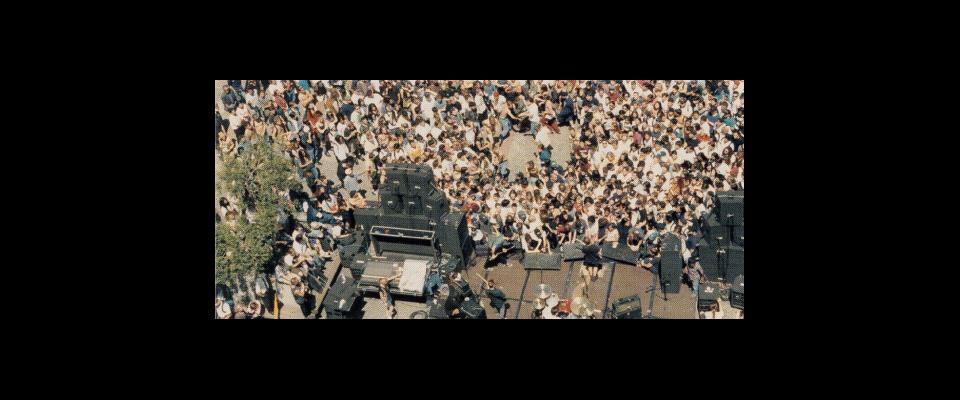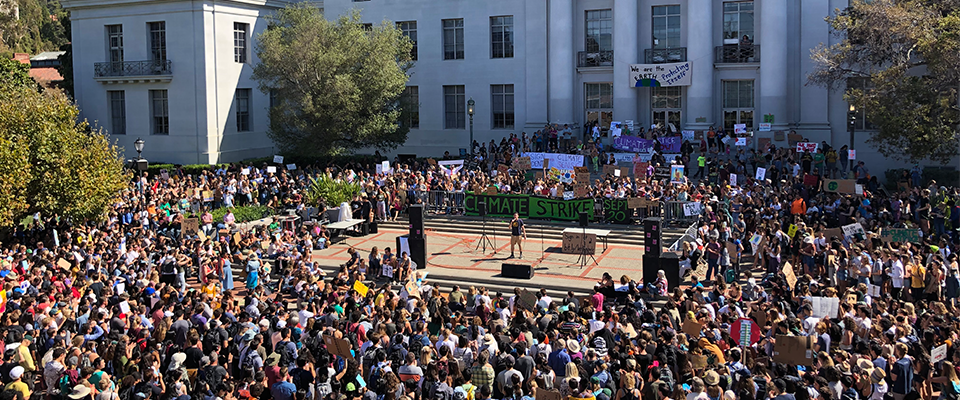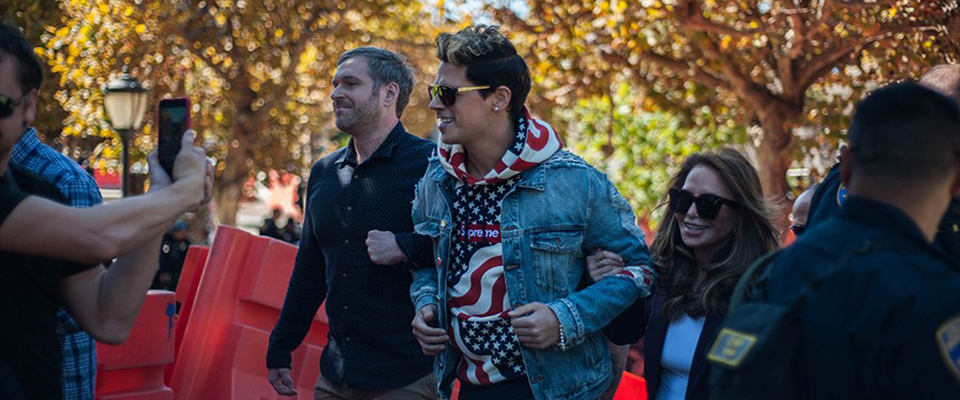In Lower Sproul, free concerts are a long (and loud) tradition.
At five past noon, 15 students wait patiently at the south end of Lower Sproul Plaza. They stand facing an empty stage and, behind it, a quiet Eshleman Hall. Ferraby Lionheart is due to play. The assembled audience is small by any measure, but nonetheless eager for an hour of acoustic folk on a grey Friday afternoon. Finally, at 12:15, Lionheart arrives—and, without a word, launches into song.
Students crowd closer to the stage or perch on four oversize planters framing the ad hoc venue; others pull out laptops, study from notebooks, dig into lunch, or simply sit and watch. The music spills out over campus, across Bancroft Way, and into the open windows of offices surrounding the plaza, just as it has for decades.
Free concerts like this have been offered in Lower Sproul Plaza at noon on Fridays for longer than most of today’s undergraduates have been alive. Big or small, the concerts have always embodied their respective zeitgeist. Over the decades, shows have featured such iconic performers as Country Joe McDonald, Talking Heads, Devo, Green Day, and Girl Talk.
Behind them all has been SUPERB, the Student Union Program, Entertainment, and Recreation Board. The nonprofit, student-run group’s mission is simple: to entertain the campus community. Under the auspices of the Associated Students of the University of California, SUPERB also hosts games, films, comedy, and art events.
Free concerts account for one of the largest line items on SUBPERB’s annual budget, but unlike film screenings and comedy shows, for obvious reasons, they don’t generate any income. SUPERB itself has lost around half of its funding over the past decade, as it competes with an ever-growing number of student organizations for funding from ASUC. The organization’s concert budget has correspondingly shrunk, reaching an all-time low of $40,000 last year.
In 2008, SUPERB staff launched a referendum to impose a mandatory student fee of $4.50 to support their entertainment efforts. But the idea was unpopular on campus and ultimately failed, which makes one wonder: Why do it? Because it’s tradition, explains senior Kaveh Hemati ’11, one of SUPERB’s two concert managers. “This is what we do.”
The origins of that tradition are obscured in the haze of the mid-’60s (see “Rewind,”) and current staffers have only their official sweatshirts as evidence that the legacy dates back to 1964. Perhaps a more compelling reason for the concerts’ ongoing success is the one found in a 1995 opinion piece in The Daily Californian defending the shows. It praised them for filling a “much-needed niche in the local music scene” while “[opening] the door to promising local bands and lesser-known national acts” who make “some of the most exciting music on the market.”
Either way, Hemati knows Lower Sproul Plaza won’t go quiet on his watch. He’s committed to keeping the tradition alive, even if that means booking smaller acts like Lionheart who may not have the superstar appeal of past performers like the Bangles, Huey Lewis and the News, or even iconic punk band Fugazi, who in 1993 packed the plaza with lunchtime moshers.
Lead singer Ian MacKaye, whose do-it-yourself ethos gelled with the notion of a free concert in a public place, still remembers that sunny April day. “It was a pretty cool show,” he recalled over the phone in March. “I love free gigs. I love the idea of music appearing and then the passerby getting caught up in it.” Fortunately, that’s exactly what happened.
“We get there at 10, and there’s just people there the whole time, walking around us, and we were trying to set up,” he said. “We didn’t really have a proper sound check or anything. We were really just flying by the seat of our pants. And then we just jumped into the gig, and suddenly realized that all these people who had been walking to class had suddenly congealed into this enormous crowd.”
With the plaza packed to the gills and fans lining its mezzanines, balconies, and outlying areas, Fugazi played a propulsive set worthy of Lower Sproul lore. Immediately before the two-foot stage on which the four-piece band played, fans swirled in a mosh pit. Elsewhere in the plaza, students danced or just bobbed their heads, eyes glued to the stage and Fugazi’s frenetic performance.
Then, just as quickly as it began, the noontime concert came to an end. “As soon as it was over, it was an instant dispersal,” MacKaye recalled. “Everyone just went on their way.” But few of them were likely to forget it.
As fortuitous as the circumstances of that show were, Hemati and his staff of 20 are working to recreate that magic. Given their budget constraints, sometimes that means booking niche acts for dedicated audiences, like the nu-folk fans at the Lionheart performance, swaddled in plaid just like the young musician on stage. When it comes to free shows, it’s all about getting the right band at the right time.
Every decade has its legendary shows. On November 27, 1978, Talking Heads performed another of Lower Sproul’s most memorable concerts. That was the day George Moscone and Harvey Milk were assassinated in San Francisco City Hall, but the show went on. Live recordings of two songs eventually made it to a career-spanning Talking Heads box set.
Earlier in 1978, Dead Kennedys performed “Kill the Poor” and “Viva Las Vegas” to a crowd who didn’t yet know what moshing was. Devo visited in 1988, performing songs like “Whip It,” “That’s Good,” and “Girl U Want” in ketchup-red uniforms and their trademark conical plastic hats, before adoring fans with Eshleman Hall as a backdrop.
Notables over the last two decades have included East Bay rock groups Green Day and the Counting Crows, as well as Ratatat, Girl Talk, Steve Aoki, Mason Jennings, the Coup, and many more. A couple of years ago, SUPERB presented a show by rap artist Immortal Technique that filled Lower Sproul Plaza with 2,500 dancing bodies. Earlier this year, Bay Area hip-hop group Hieroglyphics played for 2,000 people.
Taken solely as a venue, Lower Sproul Plaza gets mixed reviews. In a prominent location, partially enclosed, and accessible from all four corners, it’s a natural hub of activity—as Fugazi was happy to discover. It’s also a meeting point between campus and community.
Yet the plaza’s concrete floor isn’t ideal for dancing, and contending with winter’s wind-whipped rain is nobody’s idea of fun. Setting up the stage and audio equipment week after week can be a challenge, taking up to two hours for a five-person crew, said former concert manager Tony Leong ’05. And then there’s the sound itself, renowned for bouncing between buildings like a hyperactive ping-pong ball.
Leong, for one, didn’t mind the effect. He ran sound for SUPERB when he was a student and now helps put on shows for promoter Another Planet Entertainment. (His boss and the company’s founder Greg Perloff ’76, is another former SUPERB concerts manager.) “The acoustics in Lower Sproul aren’t that bad,” he said. “I actually enjoyed mixing out there. It’s kinda cool hearing the concerts reverberate through the plaza. I think it made it sound bigger, and it made it sound legit.”
But a fondness for Lower Sproul Plaza’s sonic footprint is far from universal. In 1995, due to concerns over noise levels, a University committee came perilously close to limiting the volume of noontime concerts to 50 dB. That’s about equal to the sound of a household appliance, firmly ruling out the prospect of live music.
The proposition was dropped, and concerts are currently limited to a healthier 100 dB, but strict regulations still dictate the times during which amplified music can occur: between noon and 1 p.m. and again between 5 p.m. and 7 p.m., sound checks included. Eugene Steele, a professional sound engineer doing sound for SUPERB, says this rule can present a challenge, but not one worth flouting. After all, who wants to be responsible for upsetting tradition?
Over the years, Lower Sproul Plaza has also hosted countless Battles of the Bands, often organized by SUPERB, as well as both impromptu and organized drum circles, and other unplugged performances dating back to the plaza’s construction in the mid-’60s. The UC Jazz Ensembles have used the space for their Spring Showcase, and currently perform for free Thursdays at noon in the adjacent outdoor seating area of the Bear’s Lair.
Next year, the campus plans to undertake a major remodel of the entire Student Community Center, which should beautify the plaza without impacting its utility. To begin with, the plan calls for demolishing the eight-story Eshleman Hall and replacing it with a longer four-story building along Bancroft Way. The MLK Center is also scheduled for an expansion, with a new glass front overlooking the plaza. Acoustics are sure to improve, and perhaps live music in all its forms will survive another 45 years in a revitalized Lower Sproul Plaza.





















